#gethsemane
Text
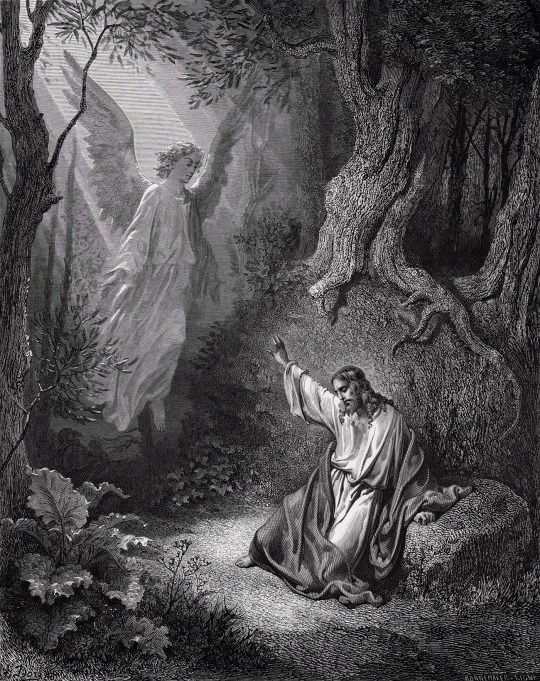
The Agony in the Garden by Gustave Doré
#jesus christ#jesus#christ#angel#art#gustave doré#garden of gethsemane#garden#gethsemane#la grande bible de tours#angels#god#agony#christian#christianity#religion#religious art#bible#biblical#religious
604 notes
·
View notes
Text

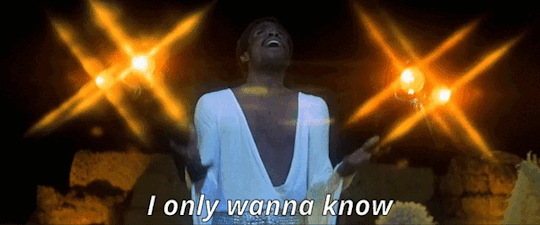

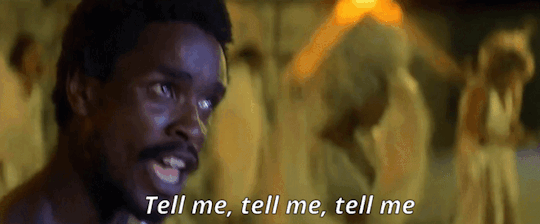
Jesus Christ Superstar (1973)
#these men want answers!#jesus christ superstar#jcs#judas#carl anderson#andrew lloyd webber#jcss#jesus christ superstar 1973#gethsemane#easter film#superstar#my gifs#jesus christ superstar gifs#ted neeley#judas iscariot#tim rice
214 notes
·
View notes
Text
Gaza's Gethsemane
Today is Maundy Thursday, when Christians remember Jesus’s Last Supper, his final meal with his closest friends before his arrest and execution by the Roman Empire.
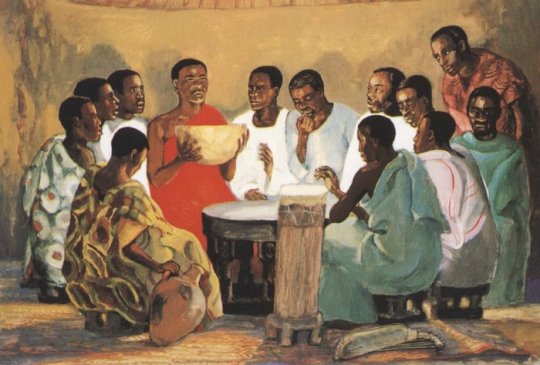
Meanwhile, right now, in Jesus’ own homeland, millions suffer starvation and terror, displacement and death under Western-funded Israeli colonialism and continued military assault. Israel blocks food from reaching them, leaving Palestinians in fear that any "supper" they can scrounge up might be their last.


After their meal, Jesus led his friends into the Garden of Gethsemane, where he prayed in anguish, fearing all he was about to endure: criminalization, torture, and a painful public death.

Jesus begs his friends to “stay awake” as he wrestles — just to be present, to make him feel a little less alone. How do we respond to Jesus’ plea by “staying awake” to Palestine’s current agony?
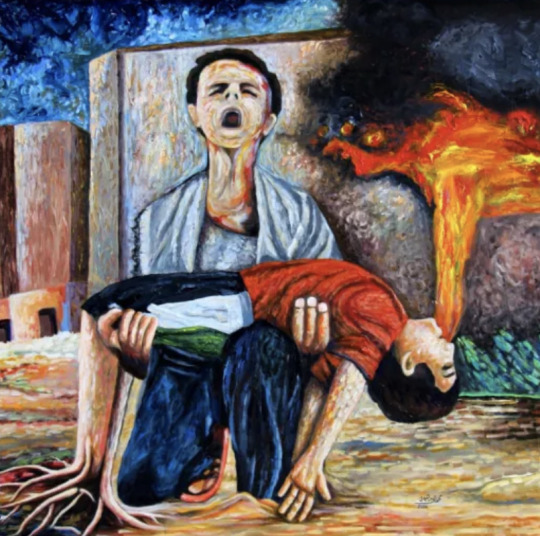
"Cry" (2016) by Mohammed Almadhoun.
That question also leads me to ponder another: how does God join Palestinians in their agony? Where is God in their suffering?
Palestinian Christian Mitri Raheb seeks to answer this question of where God is in his 2015 book Faith in the Face of Empire.
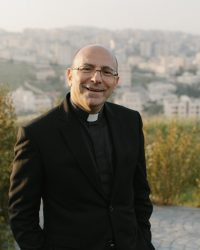

Raheb looks at the history of the Palestinian region, from ancient times to today, as a long chain of different empires — from the Assyrians to the Romans, Ottomans to Western-funded modern Israel.
He says that this long history of occupation is what gave Palestinians the ability to notice God where those in power do not: among the powerless. It is this revelation, Raheb declares, that has empowered Palestinians — Jewish, Christian, and Muslim — to survive and resist Empire again and again.
Raheb writes about how in ancient times, the divine was made
“...visible and omnipresent in the empire with shrines and temples that represented not only his glory but also that of the empire. God’s omnipotence and that of the empire were almost interchangeable. He was a victorious God, a fitting deity for a victorious empire.
At the other end of the spectrum there was the God of the people of Palestine, whose tiny territory resembled a corridor in Middle Eastern geography. ...This God was a loser. He lost almost all wars, and his people were forced to pay the price of those defeats. In short, this God did not appear to be up to the challenge of the various empires. His people in Palestine were forced to hear the mocking voices of their neighbors who taunted them, 'Where is your God?' (Ps 42: 3, 10).
The revelation the people of Palestine received was the ability to spot God where no one else was able to see him. When his people were driven as slaves into Babylon, they witnessed him accompanying them. When his capital, Jerusalem, was destroyed and his temple plundered, they saw him there. When his people were defeated, he was also present. The salient feature of this God was that he didn’t run away when his people faced their destiny but remained with them, showing solidarity and choosing to share their destiny.
Consequently and ultimately, Jesus revealed this God on the cross, in a situation of terrible agony and pain, when he was brutally crushed by the empire and hung like a rebellious freedom fighter. The people of Palestine could then say with great certainty [that their God] ‘in every respect has been tested as we are’ (Heb 4:15).
For the people of Palestine this meant that defeat in the face of the empire was not an ultimate defeat. It meant that after the country was devastated by the Babylonians, when everything seemed to be lost, a new beginning was possible. Even when the dwelling place of God was destroyed, God survived that destruction, developing in response a dwelling that was indestructible. And when Jesus cried on the cross, “My God, my God, why have you forsaken me?” (Mk 15:34), that soul-rending plea was just the prelude to the resurrection…”
It is this revelation that God sides against empire, Raheb continues, that keeps the Palestinian spirit alive through horrible oppression. Though the world may call such faith foolish — how can you believe God is with you and that God will have the final say, when all evidence points to your abandonment and defeat? — it is wisdom to the oppressed. Raheb describes how this wisdom feeds Palestinian resistance, over and over across the millennia:
The art of survival and starting anew is a highly developed form of expression in Palestine, and one I see daily. People’s lives, businesses, and education are interrupted by wars and the aftermath of wars over and over again, and yet I witness people refusing to give up, taking a deep breath, and beginning again. Logically, it is foolish, and yet there is deep wisdom in such a course of action.
I’m often asked by visitors how I can keep going. Everything seems to be lost, the land “settled” by Israel, the wall suffocating Palestinian land and spirit, the world silent, and hope almost gone.”
Raheb's answer to them is that God’s presence in and among the suffering, and God’s promised resurrection, of renewal in the face of all terror and death, is what keeps him and his people going.
As we enter into these final days of Lent, I pray for hearts and minds opened to witnessing God’s solidarity with and resurrection for Palestinians suffering imperial brutality. I pray that the Palestinians will survive as they always have — “afflicted in every way, but not crushed; perplexed, but not driven to despair; persecuted, but not forsaken; struck down, but not destroyed” (2 Cor 4:8–9).
92 notes
·
View notes
Text
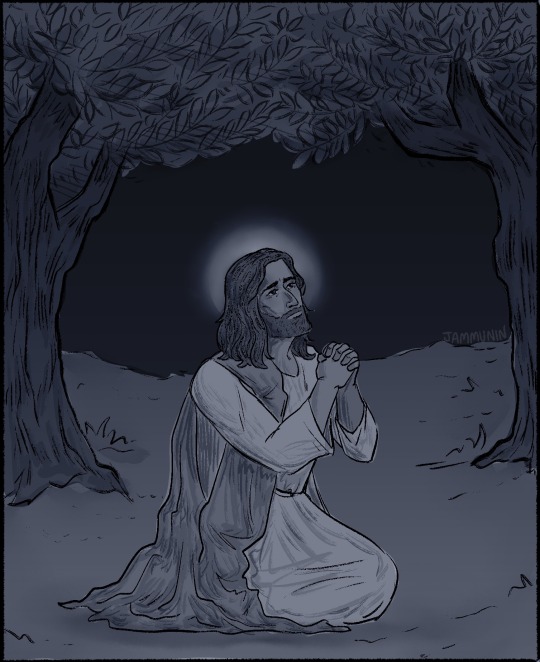
gethsemane
#my art#art#artists on tumblr#digital art#photoshop#fanart#jesus fandom#jesus christ#jesus of nazareth#jesus fanart#jesus#bible fandom#bible fanart#holy bible#the bible#gethsemane#jesus christ superstar#garden of gethsemane#praying
89 notes
·
View notes
Text
Gethsemane, Bill Scully Apologia, and Maggie the Emergency Contact
Dialogue and Play-By-Play Analysis:
Bill: "I picked up the phone when they called Mom. I thought you could use a change of clothes."
Scully: "Thank you... where's Mom?"
Believing her cancer is still a secret, Scully automatically places Bill's importance below her mother, wanting to talk freely with Maggie (without Bill.) Bill sees and understands this; and is hurt that she still won't open up to him despite being here, now, for her. As of yet, he doesn't act on that hurt.
Bill: "I didn't tell Mom what happened...."
Scully: "...But I'm okay. Luckily."
Bill: "You're not okay, Dana."
Scully: "I told Mom not to tell you."
Bill: "Why?"
Scully: "Because it's very personal. Because I don't want sympathy."
For all of the just criticism against Bill later in this arc, here he is holding back his anger (an expression of his hurt) and listening, really listening to his sister. He keeps quiet, giving Scully room to fully explain herself; and even sympathetically locks eyes, giving her his full attention.
Another thing of note: he is staring at Scully with the exact look of sympathy she wanted to avoid. Mulder and Maggie know her enough to acquiesce to her "I'm fine"s; but Bill is her life-long peer, and siblings can't hide truths from each other as effectively as they can their parents or partners.
"You think you can cure yourself."
Bill realizes that his sister never told her own family-- him-- about her cancer because she does, even now, believe she can cure herself. He's stunned, shocked, even appalled; and that leaks into his voice, coming across as judgmental.
Scully doesn't deny it, caught; and sighs, frustrated, that he divined and overly-simplified something she hadn't expressed to anyone and probably would not have been able to without a beautiful speech prepared ahead of time.
"Mom tells me that you've gotten worse. That your cancer's gone into your bloodstream."
This explains why Maggie told Bill in the first place: she cracked under the strain Dana's edict of secrecy put her under, watching her daughter slowly die without any apparent attempts to circumvent that death or even to bond over their shared tragedy. Bill became her only recourse... and Bill spilled the beans (as he does, again, in A Christmas Carol.)
Scully is shaken by his bluntness, unable to shy away from the truth spoken so baldly to her face.
"What are you doing at work getting knocked down? Beaten up? What are you trying to prove-- that you're going to go down fighting?"
Scully: "Now, c'mon Bill--"
Scully is deferring back to an old sibling dynamic: Bill misunderstanding, or only understanding enough to feel she's acting out of turn; and her attempting to draw him away from his preconceived notions. In this case, however, he's right; and she's avoiding the truth of that (subconsciously.)
Bill stops her by slapping down the clothes, getting her full attention.
"Y'know what Mom is going through? Why do you think I didn't tell her when they called?"
"What should be doing?"
Bill: "We have a responsibility-- not just to ourselves, but to the people in our lives."
And he's absolutely correct here: Scully has been so focused on work and its promise of a cure that she's forgotten to give space to those suffering alongside her.
"Just, just because I haven't bared my soul to you or to Father McCue or to God, it doesn't mean I'm not responsible to those important to me."
Here Scully reveals she thought emotional distance and soldiering on was her way of protecting her loved ones from her burdens, providing them strength in the face of her worsening health. In reality, it worsened their fears and burdens; and furthered their isolation... except for, ironically, Mulder, who wasn't ready to face the implications of her impending death, anyway.
"To who? This guy Mulder? But where is he, Dana? Where is he through all this?"
Bill is less right here: from his perspective, Dana has (once again) wrapped herself up with a man whose authority and work ethic supersedes Bill's love and concern for his sister-- another in the pattern of their late father and Daniel Waterston and Jack Willis. Bill isn't stupid: his above reproach also reveals he knows Mulder knows about Scully's cancer; and the fact that her partner did and still left her alone to deal with it to "pursue his career" while Bill hasn't been able to be there to support her at all eats away at him, makes him hate the man. (And still he's civil when he meets Mulder, even talks with him in terms he believes a workaholic will understand-- "Let's keep the work away from here"-- only getting rough when he misinterprets Mulder's blank face in response-- "Let her die with dignity.")
Despite being wrong here, Bill still hits the mark; because Mulder did wander off on a quest. But Scully can't argue for Mulder without betraying her own reticence, her own need to keep Mulder in the dark for Mulder's sake-- because that would betray her feelings in a way that she doesn't want to discuss with Bill, especially after Mulder has consistently dodged that serious conversation for years now. So, she picks up her clothes and ends the conversation.
In-Depth Analysis
Maggie Was Scully's Emergency Contact
The hospital called Maggie when Scully was rushed in, unconscious; and while this doesn't outright disprove the theory Mulder might also be an emergency contact, it certainly fits in with the pattern of him being called to the hospital and let into Scully's room by Maggie and not the other way around (i.e. One Breath and Wetwired.) Furthermore, Mulder isn't alerted (that I know of) to a missed call from the hospital after his return to civilization, meaning the hospital didn't notify him at all.
Bill the Bully?
Is Bill a despicable figure? Most definitely... in a deleted Memento Mori scene-- which is why I think they cut it. Though his words are brusque, even cruel in their blunt honesty, Bill, apart from that scene, doesn't seem to willfully inflict or weaponize guilt against his sister, wielding it only as a reminder of how much her family is left out of her life, how much they want to be there for her and don't understand why she won't let them in. It's a fundamental difference in how they approach life; and both are forceful about their insistence on doing things their own way.
Scully is used to being everyone's source of strength (Maggie places her on a pedestal even above her brothers in Memento Mori), which hinders her from opening up or betraying her weakness. Being "the strong one" for so long turned into a fear of failing others; but this reticence has the opposite effect, ostracizing and distancing her family (and Mulder) in her struggles to keep them unaffected. Their divide grows as the years go on (though it seems an equilibrium of sorts has been reached after Emily, since she mentions them fondly in How the Ghosts Stole Christmas and indirectly in Millennium.)
Bill Is Right (in This Instance)
On its face, Bill's speech is unrelenting and out of left field... but is it, really?
Bill is told about his sister's cancer only when it has become irredeemably terminal. He arrives on land, either before or after Maggie's revelation, and finds the rest of the family ignorant and his mother having to shoulder that burden, alone, because his sister refused to let her tell anyone else the news-- meaning, Maggie has been suffering in silence the entire cancer arc, trying to abide by her daughter's terms for space and silence on the topic. However, Scully's definitive terminal diagnosis broke her; and Maggie, having no one to turn to support because Dana still refused to talk about it, finally confessed to her priest and reached out to her son for strength. Bill sees how hard this has been on her and tries to alleviate that burden by adopting his sister's methods: keeping Maggie in the dark as much as possible. It honors what he knows to be his sister's wishes and his mother's fears.
In this scene Bill is absolutely in the right. He and his sister, while not incredibly close, have no ill will between them; and he finds out that not only has she been slowly dying for months and sworn their mother to secrecy but she also still refused to tell him, even when he dropped everything to bail her and Maggie out with this act of kindness. This is wrong-- it is-- and his speech rebuking his sister is as deserved as Scully's are to Mulder whenever he acts only in stubborn self-interest.
Bill is hurt, Bill is grieved; and Bill drives that home, peeling back his sister's denial by exposing her true intent: "You think you can cure yourself." The ludicrous nature of her expectations-- cure incurable cancer and never tell a soul so she won't have to 'suffer' the shame or embarrassment of their sympathy or pity-- galls him; and he's right. It's Scully's struggle and her burden; but it's not just her struggle or burden: her family and loved ones are losing her, too, and that pain is just as powerfully frightening. Bill wants more from her than an immovable pillar of strength-- and that's a good thing. Maggie needed her to be "the strong one", and Mulder needed her to keep fighting; but Bill just wanted his sister to tell him the truth and let him in.
A last note: Bill grew up with Dana-- he knows her propensity to get lost in father figures and demanding authorities. He probably sees Mulder as another Daniel Waterston or Jack Willis, an extension of her undisguised adoration for their late father. He's naturally protective (as we see in Redux II, though grossly misplaced) and thinks Scully is losing that stability in herself the more engrossed she becomes in her work (ex. Gethsemane-Redux II and A Christmas Carol.) These fears and concerns are expressed in overbearing finger-wagging and anger rather than communication, a (sadly) common affliction in a family growing a more distant with time and lives necessarily apart.
Scully Believed She Could Cure Herself
Since Memento Mori, Scully's modus operandi has been to avoid, avoid, avoid the topic of her cancer (and the death of her father, her abduction, etc.) The following cases rarely touched on her illness unless she had a concerning diagnosis or needed further treatment, i.e. Zero Sum and Elegy. Radiation was likely ruled out as ineffective since the skirmish with Dr. Scanlon (and was a drain of her valuable energy and health without any chance of helping, regardless); so, Scully probably opted for more obscure treatments, buying time while she and Mulder chipped away at their work.
In the back of her mind, she believed, truly, that she wouldn't die: that her cancer could be tucked away from her family and cured before Bill or the others ever found out. As we know, Maggie bore the brunt of her daughter's edict of silence alone, finally caving when the cancer reached Scully's bloodstream. When Bill waits for an explanation-- staring at his sister's defiance and stubbornness and pure conviction that she's fine and that the family shouldn't be worried about her at all-- he figures out her blind expectation and avoidance-bordering-on-denial and says, appalled: "You think you can cure yourself." Scully dips her head, exposed and embarrassed.
The beginning of Gethsemane proves Scully was still denial: "my dying wish" she professes on the one hand only to reject the priest and shake her head at Bill with the other. No, Scully did not expect to die alone without her family there. When Bill demands, "We have a responsibility-- not just to ourselves, but to the people in our lives", she parries, "Just because I don't bare my soul to you or to Father McCue or to God." Scully thought she was doing her duty by keeping her loved ones in her thoughts while carrying out her solitary battle. When Bill strips her of her further excuses-- "Who? To this guy Mulder?"-- it peels back her hyper-focused perspective, reminding Scully that it's not just her and Mulder fighting the world.
She did her family and Mulder and herself a disservice by pushing them all away to "protect them", as she realizes in Redux II: being "strong" stripped them of the ability to support each other and was damaging in the long run. In this, Bill is undeniably correct. However, where Bill is wrong is that he doesn't see that Scully believes in Mulder's ability to save her, that by following him she is doing what is best for herself.
Her partner's fervor and hope give her strength; and his inability to break under defeat keeps her fighting even in her darkest hours (and does end up saving her life.) Scully put such faith in Mulder and his abilities and his theories that she kept council only with herself (as much as possible) to keep him going, to keep the weight off his shoulders (and her mother's and her family's) so that they could move forward as a well-oiled machine, ready to snatch the cure whenever they got their hands on it. And Mulder did get his hands on it... and then it failed.
She's dying; but it's not until the cure fails that the dam breaks: everything Scully had been fearing comes rushing out of her. She gives in, crying to her mother about her crumbling lack of faith-- because the miracle cure didn't work, because her months of waiting and hoping in private were all for naught, because she's going to die and there's no possible way to escape. But it's also freeing: she can own her fear, hold onto her mother, clutch Mulder's hand, cry with the priest, finally lean into and start to heal from the weights she's been holding on her back, alone.
And she prays: death is near.
Scully Wanted to Please Bill, Too
As she told Ed Jerse in Never Again, "There are other fathers."
The ouroboros twirls on and on in her personal life, goading her to both make a stand for herself and to placate Bill's expected reactions. In this situation, she did deserve his anger; however, this dynamic continues to play out in Redux II and A Christmas Carol, separate circumstances that are outside Bill's scope of understanding or perspective. After each confrontation, her brother always backs off and begrudgingly acquiesces his sister's boundaries; but it's easy to see why he clings to his late father's behaviors-- viewing them as the only way his sister will confide in him-- and why Scully automatically responds to-- albeit with more guilt than openness-- and rejects his methods.
It's an aspect of their relationship that fell to the wayside as the series barreled onward; but there are hints of resignation on his part after the events of Emily unfolded the way they did (silent support in the courthouse and true remorse in the church.) Scully, however, is locked in grief and unwilling to open back up, yet. We're never shown on-screen what happens next; but he seems to have caused her no further problems in spite of her professional and personal scares in the future (including almost being burned alive, an unexpected trip to Antarctica, job demotion, and getting gut shot all within the span of a few months.) Perhaps he gave her up for loss, perhaps he stayed close but distant, perhaps he withdrew from the drama all together. We'll never know; and, ultimately, it's up to individual interpretation.
Conclusion
This scene sets up the hinge upon which the cancer arc (and any future Scully family drama) twists and turns.
I don't believe Bill is bad, or even malevolent: he, like any other person in a family strained with distance and death, doesn't seem to blame Scully entirely or for long; and only wishes to get through to her somehow. We saw him bully her as a child but we also saw him gift and teach her how to use a bb gun. Scully, meanwhile, balks at and softens over Bill's bluster and overstepping, always effectively putting him in his place after courteously listening to his opinion. We saw her yell and shove him as a child but we also saw her gleefully play alongside he and Charlie.
In conclusion: like all sibling relationships, there are headbutts and there are fights; but it seems, at least by their conversation here and succeeding ones in the future, that any hitch or bump in the road is smoothed over, ironed out, or fixed before it becomes permanent. Bill makes excellent points that Scully takes into consideration, changing her future dealings with Maggie and Bill and even Mulder (namely, her willingness to open up in Detour); and Bill, having said his peace, supports his sister in her decisions the rest of this arc and later in S5.
That we know about.
Thank you for reading~
Enjoy!
#txf#S4#Gethsemane#cancer arc#Scully#Bill Scully Jr.#Maggie Scully#Mulder#Bill Scully Apologia#meta#xfiles#x-files#the x files#analysis
100 notes
·
View notes
Text









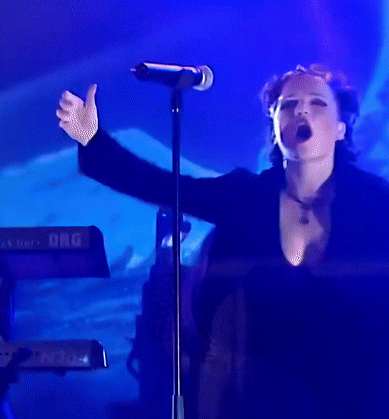
Tarja Turunen - Nightwish: "Gethsemane"
Live "Lista Chart" TV Finland 1999 (x)
#Tarja#Tarja Turunen#Nightwish#Gethsemane#Oceanborn#Lista Chart TV Finland 1999#my gif#my edit#☆- Goddesses of Metal -☆
41 notes
·
View notes
Text


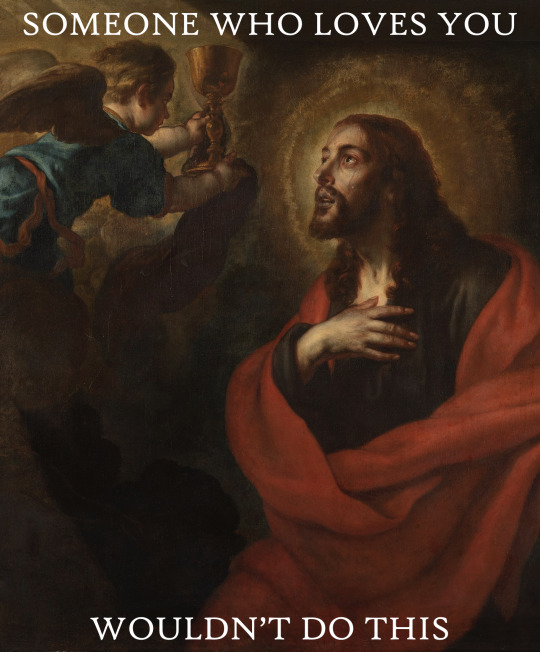


web-weaving – the agony in the garden
🩸 Christ in Gethsemane – Heinrich Hofmann // Rose – The Oh Hellos 🩸 Folio 122r of a Book of Hours – Masters of Zweder van Culemborg // Luke 22:42 🩸 Christ in the Garden of Olives – Gaspar de Crayer // Family Line – Conan Gray 🩸 Folio 122r of a Book of Hours – Masters of Zweder van Culemborg // Psalm 22:2 🩸 The Agony in the Garden – Ludovico Carracci // Sun Bleached Flies – Ethel Cain 🩸
#haha just working thru my religious trauma by making edits on the internet lmao#different than what i've done before but inspiration struck me#agony in the garden#gethsemane#jesus christ#heinrich hoffman#ludovico carracci#rose#rose the oh hellos#boreas#boreas ep#boreas the oh hellos#the oh hellos#family line#superache#conan gray#sun bleached flies#preacher's daughter#ethel cain#tw religious trauma#ex catholic#religious trauma#tw christianity#tw blood#tw death mention#art#art history#lyrics#lyric art#web weaving
80 notes
·
View notes
Text

Agony in the Garden, Frans Schwartz, 1898
99 notes
·
View notes
Text
when drew sarich went hhhhoooOOOOOHHHUUUAAAAAAAAAAAAAAIAIAIAAIAIAIAIIIYYYYYYYYYYYYYYYYYYY SHOULD AIIIIIIYYYYYY DIEEEEEEHHIIYYY WHAAYYY SHOULD EYYEEE DIEEEE
71 notes
·
View notes
Text

“Christ at Prayer on the Mount of Olives” by Nöel Coypel (1704)
24 notes
·
View notes
Text

"The God of love is kneeling at our feet.
Though we betray Him, though it is the night.
He meets us here and loves us into light."
~Excerpt from a poem by Malcolm Guite
(Art: Gethsemane, by Julia Stankova)
#poetry#Christian#God of love#Lord Jesus Christ#betrayal#Gethsemane#He takes us from darkness into light#agape
33 notes
·
View notes
Text
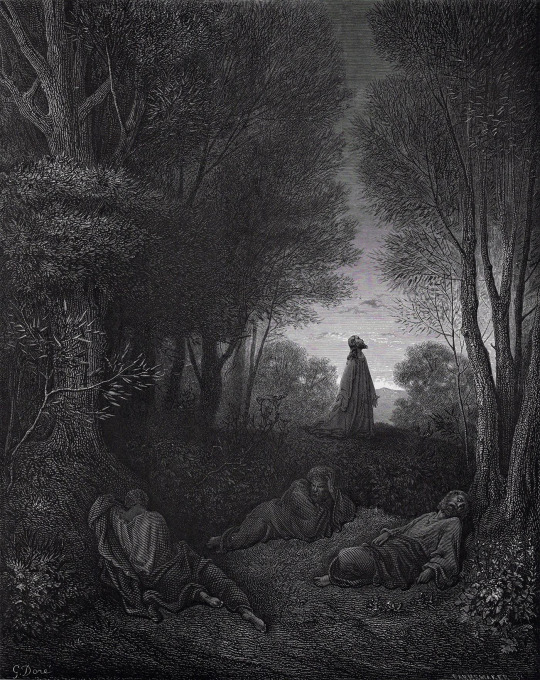
Jesus Praying in the Garden by Gustave Doré
#jesus christ#jesus#christ#art#gustave doré#garden of gethsemane#mount of olives#la grande bible de tours#garden#praying#prayer#agony#peter#john#james#gethsemane#religion#christianity#christian#religious art#bible#biblical#religious#god#james the great#peter the apostle#saint peter#john the apostle#st peter
857 notes
·
View notes
Text
god thy will is hard btw. But you hold every card. If you even care
#Idk is this anything#this line has been haunting me all weekend since I saw a live production of Jcs and got launched headlong into an obsession#jesus christ superstar#jcs 2012#jcs#gethsemane#That song is so devastating god#I’ve been listening to the Jcs remastered album all weekend and every time I listen to gethsemane I cry
28 notes
·
View notes
Text
Sorry I can’t hang out today. I have to perform Gethsemane alone in my room. Yeah I made up my own choreography to do. No, it’s non negotiable. Sorry about that.
34 notes
·
View notes
Text
Forgive me for I don’t know what I gain
Alone in this garden of pain
Enchantment has but one truth:
I weep to have what I fear to lose
Nightwish, Gethsemane
#nightwish#nightwish buenos aires 2018#gethsemane#floor jansen#emppu vuorinen#marko hietala#marco hietala#tuomas holopainen#kai hahto#troy donockley#music
45 notes
·
View notes
Text
Dana Scully: a Fear of Death Rooted in Eternal Judgment
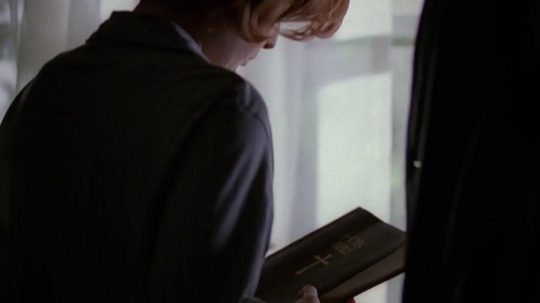
I think Scully's fear of death is rooted in a fear of judgment.
According to her faith, one either gets into Heaven or Hell (with a pit stop here or there to atone for their sins.) One would think that would be a comfort to the morally unbreakable Dana Scully.
But it isn't.
During her atheistic arc (Season 1 through early Season 2), Scully was determined to do her job and do it well. The paranoia of death didn't cling to her as it does in later seasons.... until Beyond the Sea. Her father's ghost visiting her right after his death and being channeled later through Luthor Lee Boggs, twice-- it takes its toll, unwinding the foundational principles of her life: that Death is final; and that there are no ghosts or psychics or even angels or demons, just sick men and women who abuse others through their superstitions. Scully chooses ignorance, reverting away from this new territory because "I'm afraid... I'm afraid to believe." The rest of Season 1, she didn't want to die, panicked in the face of it; but wasn't as paranoid as, again, later seasons.
Then One Breath happens: Scully experienced something she "couldn't find the words" to explain, even when facing death alongside Mulder in Dod Kalm. It's Scully who is fearless as their end approaches, reassuring Mulder he has nothing to fear based on that experience. Thus, One Breath began her agnostic arc-- where she believed, deep down, but was afraid to fully accept that belief (i.e., her shaken projections on Pfaster in Irresistible and her activated voodoo curse in Fresh Bones.) Death is a place of peace, hence why she denies it to Pfaster (we later learn in Orison.)
When we reach Season 3's Revelations, Scully's agnosticism turns to religious terror. "God is speaking, and no one is listening", she confesses to the priest-- what she means is, that God has been speaking to and judging me, and I've been failing. Thus, her paranoia of Death: not because of its finality (Season 1) or promise of peace (Season 2), but because it could find her at fault and deny her a blessed eternal life.
In Season 4, Scully doesn't want to "run back to God" in Gethsemane; but faces her fears once Death is inescapable in Redux II.
In Season 5, she battles with her religious fragility, struggling for peace after her daughter is stolen before her Christian burial (Emily) and after her spirit returns during a case with angels and demons. Scully may be more vulnerable to religious manipulation, but she is also more secure in her beliefs of a peaceful afterlife.
By Season 6, Scully continues to look upon Death as God's judgment: eternal reward or eternal torment. But then Tithonus happens: Fellig shakes Scully's convictions that eternity is a good thing, showing her the soul of an eternally tormented man... making her wonder if she is guaranteed a happy ending, after all.
This brings up to Season 7's Orison, where Scully stands in judgment of Pfaster and the "Reverend" Orison. When she murders Pfaster in cold blood, her doubts and criticisms rise up against her, brandishing her with the same immoral code-- thus, making her fear eternal condemnation from God: the end meted out to both convicts, or an immortal torment ala Alfred Fellig. This was an extremely crucial moment for her development as a character... and would have been given no resolution if not for Gillian's all things.
all things is the resolution to Scully's paranoia: "God talks back", she comes to terms with herself, and makes a final decision out of principle and not panic, out of assuredness and not anguish. Scully is secure; and she finds the stability to embrace her beliefs, religion, and faith as it should be: a source of rest, a refuge from fear.
Thanks for reading~
Enjoy!
#txf#xf meta#meta#xfiles#x-files#the x files#Scully#S1#S2#S3#S4#S5#S6#S7#Beyond the Sea#One Breath#Irresistible#Fresh Bones#Revelations#Never Again#Gethsemane#Redux II#Emily#All Souls#Tithonus#Orison#all things#Mulder#Bill Scully Sr.#Emily Sims
36 notes
·
View notes